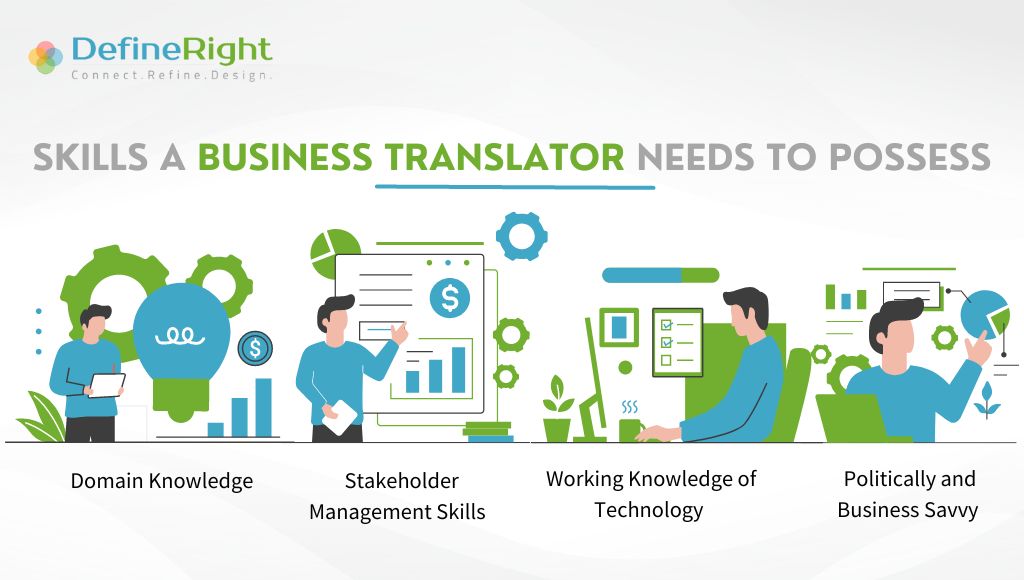
Imagine an Analytics Project Team in Action. The project team comprises members from the business teams and the technical teams. The business team members are the people that have the operational expertise and the business understanding of how the proposed solution will fit into their day-to-day operations. The technical team may have data engineers, data architects, Visualization experts, UI/IX Experts.
If you have been part of enough such meetings, you will know that a typical issue in these meetings is both parties saying – But they don’t understand what we are trying to say. And the complaint is legitimate and has nothing to do with the competency of either team. It primarily happens because both teams speak different languages. The communication gap is because both teams have different styles, use different terminologies, and usually operate in separate divisions. Research reveals that a third of either team feels positive about their interactions with each other.
In today’s business environment, where most organizations are using similar technology for solving their problems, technology is no longer the differentiator. If businesses are thinking that investing in the right technology and then bringing in someone who has experience in implementing that technology is enough, it is time to re-think. The differentiator for businesses today is the top-notch execution of their projects, and one of the most important factors of top-notch execution is effective communication. So how do businesses ensure that their cross-functional project teams are communicating effectively? About five to six years back, Mckinsey wrote an article in the Harvard Business Review about the importance of an Analytics Translator. We can expand the same role to a business translator to make them apply to broader technical projects and not just Analytics projects.
Who Is a Business Translator?
Business Translators play a very important role in bridging the technical expertise of the technical teams with the business and operational experience of the business teams. They do not possess deep technical expertise, nor are they subject matter experts in the business domain that they are working in. They, however, understand the systems, processes, and data in the domain that they are working in well enough to be able to ask the right questions. They also have enough technical know-how to be able to translate the business needs to the technical team to ensure that the solution that they are building will fit seamlessly into the business operations and improve adoption.
How Do They Work?
Since the business translator knows the domain well enough, they are able to use that, in the beginning, to work with the business to listen to and help identify and prioritize their problems.
They then use the working knowledge of technology to ensure that the business requirements are being translated appropriately to a technical solution. They then ensure as the solution is being built that, they meet the immediate business requirements and is also flexible enough to adapt to changing business needs.
Though the importance of the translator role has been established, I am yet to see businesses adding this role to their project teams. There could be various reasons ranging from lack of available bandwidth for people that can play that role in the function or even the increase in associated project cost.
The best way is to train your existing business function members in this role. But sometimes, due to project urgency and bandwidth alignment, organizations fall back on hiring externally for this role. If you are hiring externally or getting a vendor in for this role, it is important to know what skills you are looking for.
What Skills Do They Have

The Business Translator needs to have the following key skills:
- Domain Knowledge – They need not be experts in the domain that they are working in because that expertise is generally provided by the Business Function Team Members. They, however, need to understand the business processes, systems, and data in the domain and the potential impact of the interplay of each.
- Working Knowledge of Technology – Though they are not hard-core technologists, they should have a working knowledge of the technology bucket that they are working with. They need to know the application of available technology to the business use cases.
- Stakeholder Management Skills – Since they are working with a cross-functional team, they need to have excellent communication and stakeholder management skills. Most projects these days have cross-functional and cross-cultural team members, and the translator needs to have the sensitivity to navigate the varied expectations of the stakeholders.
- Politically and Business Savvy – Together with the above skills that are teachable, one of the most important “less-teachable” skills that a translator need is an intrapreneurial mindset. They should be able to effectively navigate the many technical, political, and organizational roadblocks that will emerge during the project. They need to be able to listen effectively, read between the lines, and ask the right questions. Since this skill is less teachable and less straightforward, it depends on the organization’s ability to bring the right people to this role.
This is a person that has a combination of hard skills and soft skills. The hard skills can be tested based on the experience that the person has. For soft skills, you need to have an open and quick feedback mechanism to ensure soft skills alignment.
Though a big part of the translator’s job is to ensure the effective flow and translation of business ideas to technical solutions, that is just one part. The second and equally important part is they bring a degree of cohesiveness to the team that allows for effective risk mitigation and ensures that the solution aligns perfectly with the needs of the business and delivers impact.
At DefineRight, as part of our business enablement services, we believe in training our people to speak both languages – business and technical and be able to decipher in both directions. That ensures that solutions fit like a glove into the business operations and are flexible to changing business landscape. With business processes becoming complex, the role of a business translator is going to emerge as very critical for the success of your projects.
